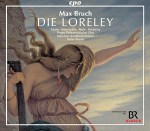|
Back
03/23/2019
Max Bruch: Die Loreley, Opus 16
Michaela Kaune (Lenore), Magdalena Hinterdobler (Bertha), Danae Kontora (female vintner), Thomas Mohr (Palgrave Otto), Benedikt Eder (Leupold), Jan-Hendrik Rootering (Reinald), Thomas Hamberger (the archbishop), Sebastian Campione (Hubert), Prague Philharmonic Choir, Lukás Vasilek (chorus master), Munich Radio Orchestra, Stefan Blunier (conductor)
Live recording: Prinzregententheater, Munich, Germany (November 23, 2014) – 143’06
cpo 777 005-2 (Distributed by Naxos of America) – Booklet in German and English – Libretto in German and English

   
“Ich weiss, dass du in Treuen dein ganzes Herz mir gibst!” (“I know that you give me your whole heart in faithful love!”)... such irony soon crumbles. Emanuel Giebel’s cloddish libretto, nonetheless, paved way for Max Bruch’s majestic treatment of The Rhine’s folkloric murmurante roche. Loyal to the core in the Romantic mode, while the Cologne-born composer is more recognizably linked to the Scottish Fantasy and the Violin Concerto n° 1 in G minor, it’s hard to imagine the existence of operatic endeavors. Max Bruch’s second opera has never been captured until now on this cpo recording, serving those thirsty for grand romantic opera. Die Loreley (1863) transfixes and argues the German’s staunchly-structured score and heavily draws upon his skills in oratorio writings.
While Die Loreley is blessed with persuasions of Mendelssohn, von Weber and Marschner, they’re distant reaches outside the Germanic canon. Because of the opera’s pastoral setting, the lovely “Introduction” reveals the main, fateful motif, but for a few bars it quickly harkens back to Gounod’s Mireille (1864) and a dash of provincial élan. As Hubert (Sebastian Campione) exuberantly weighs in with the vintners (in Act I), there’s even a Meyerbeerian capture in the matrix (8’31) that pokes at the middle segment of Robert le Diable’s (1831) “Sicilienne.”
Bruch’s brushes of choral numbers add heft and richness to Die Loreley. The Prague Philharmonic Choir (PPC) acts as another principal character, contributing not only as a major thrust to the plot, but also by remarking about the action at hand. The a cappella sprinkled “Ave Maria” is the first sublime encounter that easily reflects Gounod’s Faust (1859) or Le Pardon de Ploërmel (1859). But these choral moments flourish on many emotional levels. Lukás Vasilek is put in charge of the ominous poltergeist repartee during the abbreviated but pivotally important “Grande Scène” that can be described as “lithely brooding in reprimand” when stacked up against sharper angles from Verdi’s Macbeth (1847.) This terror eventually turns to vengeance justifée in Act IV’s “Finale” which flutters between major and minor chords, returning to the original motif but also slightly pointing to pre-Wagnerian vestiges (even though Bruch abhorred Wagner.)
Thomas Mohr’s Palgrave Otto is pristine, especially when paired with Michaela Kaune’s delectable soprano voice. In Act I Bruch places the listener inside amiable, soaring lines during the beautiful Lenore/Otto duet. Bruch scores the soon-to-be-siren as absolute innocence. [Maybe the lesson of Die Loreley quietly reveals more relevancy than credited when juxtaposed with current egregious behaviours!] But the conflicts quickly begin to unwind as we hear the powerful dimensions of an unabashed Michaela Kaune, consumed by hurt and anger.
The balance of principals equally contribute to the overall satisfaction of Die Loreley: Magdalena Hinterdobler’s deeper soprano register, singing Bertha (albeit not a significantly big role), well compliments that of Mlle. Kaune while Jan-Heindrik Rootering convincingly chimes in as the Rhineland’s foreboding soothsayer with his well-matched bass-baritone voice. Danae Kontora can’t go without mention as the female vintner as she sings with delicate, soufflé proportions.
Stefan Blunier’s realistic and effective tempo makes the lusciousness of Die Loreley swell without usurping Bruch’s moistened Romantic landscape. Those following in fond footsteps of pure Germanic Romanticism will find this Max Bruch release an invaluable discovery...stellar musical depiction, flowing like a placidly frightening passage near Sankt Goarshausen.
Christie Grimstad
|